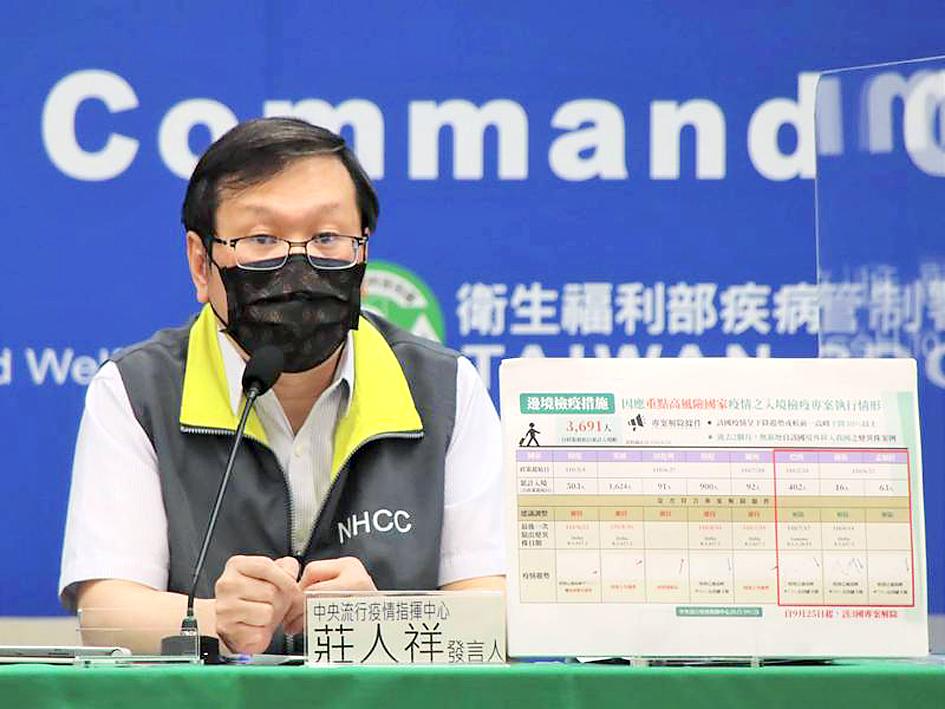Travelers from Bangladesh, Brazil and Peru are no longer required to quarantine at a government center, and from Saturday can choose to quarantine at hotels, the Central Epidemic Command Center (CECC) said yesterday.
The three nations are no longer considered “key high-risk countries,” as their COVID-19 case numbers have continued to fall, the CECC said, adding that no travelers from these countries have been confirmed to be infected with COVID-19 in the past two months.
The revised classification would allow travelers from the three countries to choose where they stay during their mandatory 14-day quarantine, although they would be required to pay for their accommodation.

Photo courtesy of the Central Epidemic Command Center
Taiwan requires travelers who have been to or transited through “key high-risk countries” in the 14 days before entering Taiwan to quarantine at a government-designated facility.
The list includes India, Indonesia, Israel, Myanmar and the UK.
Travelers from other countries can also stay at a government facility, but must pay NT$2,000 per night, or at an authorized quarantine hotel.
All travelers must undergo three COVID-19 tests: two polymerase chain reaction (PCR) tests at the beginning and end of the quarantine period, and an antigen rapid test between the 10th and 12th day of their quarantine, the CECC said.
The CECC yesterday reported no locally transmitted COVID-19 infections or deaths, adding that it planned to test a New Taipei City worker again today after previous tests were inconclusive.
Hon Hai Precision Industry on Wednesday said that an engineer at its Foxconn Interconnect Technology subsidiary in New Taipei City’s Tucheng District (土城), had tested positive for COVID-19 in a rapid saliva test.
The employee, a woman in her 20s who had not received a COVID-19 vaccine, later tested positive in a PCR test performed at a hospital, the company said, adding that health authorities had arranged for the worker to be isolated.
Six close contacts of the employee were also in isolation, the company added.
Centers for Disease Control (CDC) Deputy Director-General Chuang Jen-hsiang (莊人祥), who is the CECC’s spokesman, said that the worker tested negative in a traditional nucleic acid test.
The employee’s sample was yesterday delivered to a CDC lab in Taipei, which found that only a single gene was positive, with a cycle threshold value in the 30s and a negative serum antibody test result, he said.
The CECC would likely test the woman again today, he said, adding that it would wait for the result before declaring it a local case.
The CECC yesterday reported nine imported cases: two from Indonesia, two from Vietnam, and one each from Austria, India, Kenya, the Philippines and the United Arab Emirates.
None had received two or more COVID-19 vaccines, it said, adding that six of them had been confirmed with the virus or tested positive for COVID-19 in the past.

Eight restaurants in Taiwan yesterday secured a one-star rating from the Michelin Guide Taiwan for the first time, while three one-star restaurants from last year’s edition were promoted to two stars. Forty-three restaurants were awarded one star this year, including 34 in Taipei, five in Taichung and four in Kaohsiung. Hosu (好嶼), Chuan Ya (川雅), Sushi Kajin (鮨嘉仁), aMaze (心宴), La Vie by Thomas Buhner, Yuan Yi (元一) and Frassi in Taipei and Front House (方蒔) in Kaohsiung received a one-star rating for the first time. Hosu is known for innovative Taiwanese dishes, while Chuan Ya serves Sichuan cuisine and aMaze specializes

STATS: Taiwan’s average life expectancy of 80.77 years was lower than that of Japan, Singapore and South Korea, but higher than in China, Malaysia and Indonesia Taiwan’s average life expectancy last year increased to 80.77 years, but was still not back to its pre-COVID-19 pandemic peak of 81.32 years in 2020, the Ministry of the Interior said yesterday. The average life expectancy last year increased the 0.54 years from 2023, the ministry said in a statement. For men and women, the average life expectancy last year was 77.42 years and 84.30 years respectively, up 0.48 years and 0.56 years from the previous year. Taiwan’s average life expectancy peaked at 81.32 years in 2020, as the nation was relatively unaffected by the pandemic that year. The metric

Taitung County is to launch charter flights to Malaysia at the end of this year, after setting up flights to Vietnam and Thailand, the Taitung County Government said yesterday. The new charter flight services, provided by low-cost carrier Batik Air Malaysia, would be part of five-day tour packages for visits to Taitung County or Malaysia. The Batik Air charter flight, with about 200 seats, would take Malaysian tourists to Taitung on Dec. 30 and then at 12:35pm return to Kuala Lumpur with Taiwanese tourists. Another charter flight would bring the Taiwanese home on Jan. 3 next year, arriving at 5:30pm, before taking the

Taiwan High Speed Rail Corp. (THSRC) plans to ease strained capacity during peak hours by introducing new fare rules restricting passengers traveling without reserved seats in 2026, company Chairman Shih Che (史哲) said Wednesday. THSRC needs to tackle its capacity issue because there have been several occasions where passengers holding tickets with reserved seats did not make it onto their train in stations packed with individuals traveling without a reserved seat, Shih told reporters in a joint interview in Taipei. Non-reserved seats allow travelers maximum flexibility, but it has led to issues relating to quality of service and safety concerns, especially during